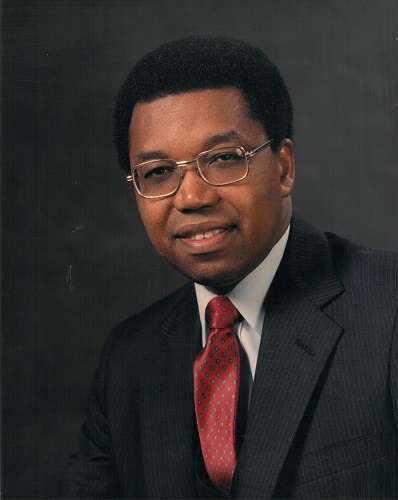Dr. James A. Hefner, 21-Year HBCU President and Champion of Students and Black Higher Ed, Passes at 76

August 27, 2015 -- James A. Hefner, Ph.D., former president of Jackson State and Tennessee State universities and former member of the Board of Trustees at Morehouse College and Board of Regents at the University of the South, passed away today in his Brentwood, Tenn., home of complications with colon cancer. He was 76.
A noted economist and expert of the black labor force, Dr. Hefner dedicated his 50-year
professional career to students at historically black colleges and universities, pushing
them against "intellectual walls" and giving them "intellectual headaches," as he
would often say. He is widely known at Tennessee State University for his tagline
"Students Matter Most" and his recitation of the African parable "The Cheetah and
the Gazelle."
Dr. Hefner served as a university president for 21 years, first at Jackson State University
from 1984 to 1991 and later at Tennessee State University from 1991 to 2005. Prior
to his years as president, Dr. Hefner served as provost of Tuskegee University from
1982 to 1984 and as the Charles E. Merrill professor of Economics and chair of the
Department of Business and Economics at Morehouse College from 1974 to 1981. He also
taught and served as a research associate at Harvard University, Princeton University,
Clark College, Florida A&M University, Benedict College and Prairie View A&M University.
After retiring as president of Tennessee State University in 2005, Dr. Hefner was a non-resident fellow at Harvard University in the W.E.B. DuBois Institute for African and African American Research; visiting Distinguished Professor of Economics and Presidential Leadership at Texas Southern University; and most recently as provost and vice president for Academic Affairs at Clark Atlanta University, where he worked diligently as he fought cancer up until the very end.
When recently asked how he wanted to be remembered, Dr. Hefner said, "As an educator
who cared about black higher education and the welfare of students."
He earned his undergraduate degree from North Carolina A&T University, his master's
degree in economics from Atlanta University, and his doctorate in economics from the
University of Colorado at Boulder.
"My father lived a life of service to historically black colleges and universities
and the students who attend them," said David Hefner, Ed.D., the youngest son of Dr.
Hefner and a 1993 graduate of Morehouse College.
"He was an intellectual disciple of W.E.B. DuBois -- a Fisk University graduate --
in that he believed in the liberation that academic excellence promised to those who
lived a life of service to the African American community, to truth and to humanity.
So his legacy is a living one because there is still much work to do. And my father
serves as an example of what service to HBCUs looks like, and we celebrate his life
and legacy."
Dr. Hefner occupied the Thomas and Patricia Frisk Chair of excellence in entrepreneurship,
a $2.3 million endowed chair at Tennessee State University. He also established two
other endowed chairs of excellence at Tennessee State, where he built eight new buildings
and renovated nearly every building on the institution's main and downtown campuses.
During his 14-year tenure there, he increased the endowment from $500,000 to more
than $25 million (through fundraising and settling a Federal Consent Decree). He positioned
Tennessee State University as a premier institution of higher learning. During his
presidency, Tennessee State University was listed in U.S. News & World Report's "Guide
to America's Best Colleges" for 11 consecutive years (1994-2005).
An advocate and proponent of African American intellectual achievement throughout
his career, Dr. Hefner established two of the nation's top honor societies, Phi Eta
Sigma and Phi Kappa Phi, at Tennessee State University and Clark Atlanta University.
Today, Clark Atlanta University is the only private, historically black university
to host a chapter of Phi Kappa Phi, America's most prestigious honor society for all
academic disciplines.
Dr. Hefner wrote extensively in the areas of employment practice and labor-force participation
rates of minorities. He was co-editor of the book Public Policy for the Black Community: Strategies and Perspectives, and had served as a research associate at Princeton and Harvard universities. At
the time of his death, he had taken leave from Clark Atlanta to complete his memoirs
and chronicle his vast experience in higher education.
He is survived by his wife, Edwina Hefner of Thomson, Ga., and three sons: Christopher,
Jonathan and David; three daughters-in-law and his beloved grandchildren.
The memorial service for Dr. Hefner is scheduled for 6:30 p.m. Wednesday, Sept. 2,
at the Poag Auditorium on the campus of Tennessee State University. The funeral service
is scheduled to begin 1 p.m. Thursday, Sept. 3, at Christ Church Cathedral, 900 Broadway
Avenue in Nashville, Tenn.
Dr. Hefner asked that two scholarships be established in his name at Morehouse College and Tennessee State University for outstanding students. In lieu of flowers, please contact those institutions to support the James A. Hefner Scholarship Awards.

